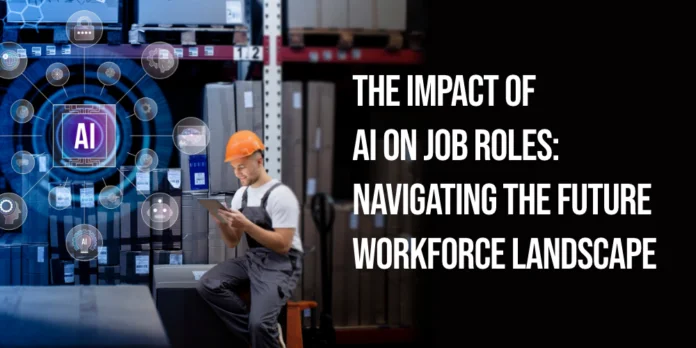There is no doubt that AI technology has engulfed almost every field and every aspect of our lives in almost all its incarnations in the modern world. Artificial intelligence is playing a significant role in rapidly transforming the workforce, with changes already apparent in the job market and the employment landscape.
As artificial intelligence continues to develop and evolve, it becomes significant that the business and workers must adapt to stay competitive and efficient.
Incorporating artificial intelligence in business means that technology can achieve more and more and further collaboration with an advanced AI development company can result in advanced automation of day-to-day operations.
In the blog below, we will further explore how AI is affecting the workforce, how it can help workers and businesses become more efficient and what are the potential benefits of implementing artificial intelligence on a larger scale.
How AI is Impacting the Job Roles?
The rise of automation and artificial intelligence is transforming the workplace, impacting jobs across various industries. Thanks to advancements made in technology, several repetitive and manual tasks can now be automated, further leading to increasing efficiency and productivity.
However, notably, this shift is also causing job roles to evolve, with some of them becoming obsolete while the new ones emerge. These latest jobs require a combination of technical skills and a deeper understanding of business processes.
Understandably, future jobs require a mix of technical skills, creativity, and adaptability to leverage the power of automation and AI effectively. As artificial intelligence continues to transform the job market and employment landscape, individuals are required to adapt to stay relevant and competitive in their respective careers.
What are Some of the Positive Impacts of AI on Jobs?
Artificial intelligence technology is poised to have a positive impact on jobs across different industries by creating brand-new roles and further improving employee productivity.
Increase in Productivity and Efficiency
It has already been proven that an increased use of AI technology also helps increase the productivity of employees. The advanced AI tools help with manual, repetitive tasks that allow human employees to focus on more complex, advanced problems, while the simpler tasks are automated.
With AI, employees are equipped to work faster and smarter, helping them to do more in less time.
The Rise of the AI Job Market
Artificial intelligence is expected to create more than 90 million jobs, as more companies choose to invest in AI. These new roles range from AI prompt engineers to machine learning engineers to automation experts and more.
Even though it is hard to predict exactly what new industries and jobs will emerge because of artificial intelligence, it is without any doubt that AI will inevitably expand the job market, focusing on technical skills and workers more equipped with AI technology.
Increase in Overall Business Revenue
When employers can get more done at less cost and time, they can also afford to increase their margins. This extra profit can be invested in new technology, people, growth initiatives, inventory, or the additional headcount.
Challenges with Artificial Intelligence in the Job Market
Some of the major challenges that the workforce faces with the introduction of artificial intelligence in the job market are:
Job Displacement
One of the most significant concerns associated with the introduction of AI in the job market is the potential displacement of the human workforce, particularly for the jobs associated with mundane or repetitive tasks. This displacement can lead to economic and social challenges, including unemployment and income inequality.
Ethical Considerations
As AI as a service takes on more decision-making responsibilities, ethical considerations become extremely critical. Lack of transparency or potential biases in algorithms can also lead to discriminatory outcomes. In this case, ensuring ethical AI practices and guidelines becomes significant to maintain fairness and accountability in the job market.
Skills Mismatch
The jobs created by artificial intelligence may require a different skill set than those being replaced. This skill mismatch can create challenges for individuals who may find their current skills outdated or irrelevant. Upskilling and reskilling initiatives become more essential to bridge the gap and ensure a smooth transition into new job roles.
How Different Industries Can Leverage AI?
Several industries can leverage artificial intelligence in different ways. Some of the prominent ones are:
Customer Service
Conversational and generative AI systems can be extremely beneficial customer service tools as they can interact with customers without human intervention. The responses can be more personalized with these tools and for complex queries, human operators can be directed.
Real Estate
A real estate company can use the AI models to answer the client questions regarding properties. The businesses can also link a language model to a relatively simple database which can then provide answers to more detailed and specific questions, such as, ‘How does the front entrance look as the sun’s rising on a clear day?’
Human Resources
Human resources can utilize artificial intelligence to interview candidates. The model could choose specific questions on the basis of the candidates’ potential roles and hypothetical examples that align with the common tasks.
Final Thoughts
The impact of artificial intelligence on the job market marks a transformative shift in the workforce landscape. While the concerns about job displacements are valid, it becomes equally significant to recognize the potential of AI in creating new opportunities and augmenting human capabilities.
Ethical considerations must also guide the deployment of AI, ensuring transparency, fairness, and accountability, as organizations shape policies, fostering a culture of learning, and navigating the evolving dynamics of the digital age.
Notably, the successful integration of artificial intelligence into the workforce requires a balanced perspective that acknowledges both the challenges and the potential for a positive transformation in how we work and interact with the technology.

